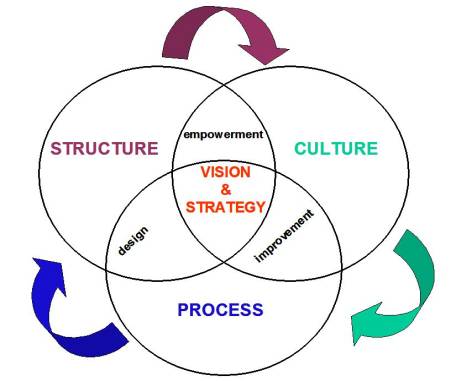|
   
| |
Rubicon’s
model of integrated development
Our
experience over many years has taught us the dangers of one-sided change
initiatives, and the importance of integrating developments in the realms of
strategy, process, structure and culture. Failure
to do so leads to inevitable disappointment: broken processes prevent the
implementation of new strategies; process improvements are blocked by structural
conflicts; re-structuring is resented and resisted; attempts at culture change
are deemed irrelevant because they do not address concrete work issues; and so
on…

The
diagram shows how these key elements are interdependent.
Lean thinking focuses primarily on process transformation, but will not
succeed unless it is supported by strategic commitment, well-designed structures
and a participative culture.
Development
can start in any of these aspects, but needs to lead to a benign cycle,
strategically driven, in which:
 |
optimised
processes provide the basis for the design of enabling – rather than
disabling - structures; |
 |
holistic
structures create the context for genuine empowerment and supportive,
stimulating relationships; and |
 |
a
culture of continuous challenge and improvement constantly increases the
value-to-waste ratio in all processes. |
|
 Process
Flow Process
Flow
The
design, control and continual improvement of value streams is at the
heart of management responsibility. Organisations need to understand
clearly what their customers or clients truly value, and ensure that
activities to create this value flow uninterruptedly with minimum
delay, disruption and waste. The "gravity" which pulls
these streams must be the requirements of the final customer, with
every tributary upstream responding to this at the right time.
Rubicon Associates are leading proponents and facilitators of this
approach, which has become known as "lean thinking" and is
currently achieving step-change improvements in sectors as diverse
as manufacturing, construction, logistics, service, retail and
finance.
|
|
 Enabling
Structures Enabling
Structures
The
value stream needs to be supported and guided by consistent,
empowering structures, which allow all contributions to be aligned
in a coherent, integrated whole. Boundaries within and between
organisations should provide minimum resistance to the flows of work
and communication. Rubicon uses a clear and proven set of principles
and a step-by-step methodology to design jobs, team tasks and
management structures - so that these optimally support the work
process and enable a challenging, participative culture to arise.
|
|
 Abundant
Culture Abundant
Culture
The
soul of an organisation is its culture: inspiring leadership brings
out the best in people by fostering involvement, creativity and
innovation at all levels. This means appreciating the importance of
learning and development as a core component of business strategy,
not an optional extra. Rubicon's "integrated learning"
approach ensures that development programmes are created and
implemented in close harmony with process improvements, structural
changes and positive cultural values.
|
|
 Seamless
Connections Seamless
Connections
Increasingly,
successful organisations will recognise that the quality of their
relationships is a central asset - which, like all assets, needs
investment, maintenance and development. The support and
co-operation of stakeholders, especially customers and suppliers
within the value stream, is an important determinant of overall
performance. Businesses must learn to collaborate effectively, in
order to compete effectively. This requires best-practice
negotiation, constructive conflict-handling, and the creation of
robust, dynamic partnerships and contracts. Rubicon has many years'
experience of developing skills, strategies and techniques for
building optimum relationships.
|
|
